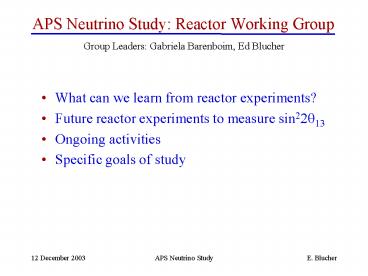E. Blucher - PowerPoint PPT Presentation
Title:
E. Blucher
Description:
at Dm2 = 3 10-3 eV2. scal relative near/far energy calibration ... Diablo Canyon Nuclear Power Plant. 1500 ft. 2 underground detectors ... – PowerPoint PPT presentation
Number of Views:36
Avg rating:3.0/5.0
Title: E. Blucher
1
APS Neutrino Study Reactor Working Group
Group Leaders Gabriela Barenboim, Ed Blucher
- What can we learn from reactor experiments?
- Future reactor experiments to measure sin22?13
- Ongoing activities
- Specific goals of study
2
Long history of neutrino experiments at reactors
20 m
KamLAND
6 m
CHOOZ
(from SJF)
Current interest is focused mainly on possibility
of measuring ???
(Study will evaluate other physics possibilities
also)
3
Reactor Measurements of
Future Search for small oscillations at 1-2 km
distance (corresponding to
Pee
Reactor experiments allow direct measurement of
sin22??? no matter effects, no CP
violation, almost no correlation with other
parameters.
Sensitivity goal sin22???0.01. Level at which
long-baseline superbeams can be used to measure
mass hierarchy,CPV sensitivity goal of
proposed accel. expts.
Distance to reactor (m)
4
Previous Reactor ??? Experiments
CHOOZ Systematic Errors
- CHOOZ and Palo Verde Experiments
- Single detector experiments
- Detectors used liquid scintillator with
gadolinium and buffer zones for background
reduction - Shielding
- CHOOZ 300 mwe
- Palo Verde 32 mwe
- Fiducial mass
- CHOOZ 5 tons _at_ 1km, 5.7 GW
- 2.2 evts/day/ton with 0.2-0.4 bkg evts/day/ton
- 3600 n events
- Palo Verde 12 tons _at_ 0.85km, 11.6 GW
- 7 evts/day/ton with2.0 bkg evts/day/ton
- 26000 n events
(from M. Shaevitz)
5
CHOOZ
Target 5 ton Gd-doped scintillator
6
Is it possible to improve the Chooz experiment by
order of magnitude (i.e., sensitive to sin22???
0.01)? Add second detector bigger detectors
better control of systematics.
200 m
1500 m
- What systematic error is attainable?
- Efficiency and energy calibration strategy
(movable detectors?) - Backgrounds
- Multiple reactor cores
- Site / depth
- Choice of scintillator (stability of
Gd-loaded scintillator) - Size, distance of detectors
7
Analysis Using Counting and Energy
Spectrum(Huber et al. hep-ph/0303232)
scal relative near/far energy calibrationsnorm
relative near/far normalization
90CL at Dm2 310-3 eV2
- Counting exp. region
- Spectrum Rate region
ScenariosReactor I 12ton7GW5yrsReactor II
250ton7GW5yrs
8
Worldwide interest in two-detector reactor
experiment
Workshops Alabama, June 2003 Munich, October
2003 Niigata, Japan, March 2004
Based on early workshops, a whitepaper
describing physics possibilities of reactor
experiment is being assembled. Excellent
starting point for this study. (Maury Goodman
(ed.) will speak about the white paper during
tomorrows working group session.)
9
- Sites under discussion
- Kraznoyarsk (Russia)
- Chooz (France)
- Kashiwazaki (Japan)
- Diablo Canyon (California)
- Braidwood, Byron (Illinois)
- Wolf Creek (Kansas)
- Brazil
- Taiwan
- China
10
Kr2Det Reactor ?13 Experiment at Krasnoyarsk
Features - underground reactor - existing
infrastructure
Detector locations constrained by existing
infrastructure
Reactor
Ref Marteyamov et al, hep-ex/0211070
11
Proposal for Reactor ?13 Experiment in Japan
Kashiwazaki -7 nuclear power stations worlds
most powerful reactors - requires
construction of underground shaft for detectors
far
near
near
Kashiwazaki-Kariwa Nuclear Power Station
12
The Chooz site, Ardennes, France
Double-CH?13?13Z
13
CHOOZ-Far detector
3.5 m
Existing CHOOZ tub
7 m
14
U.S. Nuclear Power Plants
15
Braidwood, Illinois 7.17 GW Located 24 miles
southwest of Joliet.
16
Diablo Canyon Nuclear Power Plant
1500 ft
Powerful Two reactors (3.1 3.1 GW Eth)
Overburden Horizontal tunnel could give 800 mwe
shielding Infrastructure Construction roads.
Controlled access. Close to wineries.
17
- Challenge of study How do we put together the
wide array of experimental - opportunities into a coherent, rich program that
makes best use of limited - resources? (What is most (cost) effective
sequence of experiments?) - Primary goal of working group is to provide input
needed for this exercise. - Clear statement of physics potential of reactor
experiments - Understand physics reach, cost, and timescale for
different scenarios - (e.g., fixed 10-ton detectors, fixed/movable
50-ton detectors, multiple far - detectors, best experiment)
- For each scenario, describe defensible strategy
for reaching the - claimed systematic uncertainty.
- Complete rough systematic table for different
scenarios with common - ground rules.
- How do these scenarios complement and compete
with other reactor

